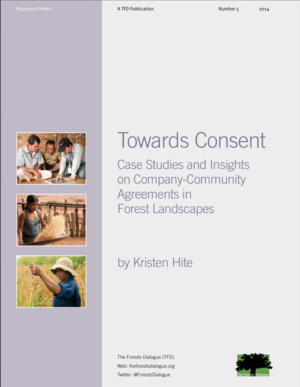Towards Consent: Case Studies and Insights on Company-Community Agreements in Forest Landscapes
Commercial operations in the forest sector include pulp, paper, and other wood product manufacturing as well as direct timber harvests. These operations generally require secure supplies of trees over many years, often leading to decades-long investments involving large tracts of land. These supplies may be purchased from others, or land may be owned or leased by a company. Whether purchased or leased, forest sector companies often find them- selves negotiating with those holding prior rights to forest lands and resources. At the same time, forests have tremendous value beyond these uses, in particular for the over one billion people globally who depend on forests for food, medicine, and materials, which can provide both a means of subsistence as well as supplemental income.
Given that companies rarely begin operations owning all the land that serves as the basis for their operations, it is often necessary for them to engage those whose livelihoods more immediately depend on forests. Among various strategies to address poverty and marginalization of many forest-dependent communities, one approach has been to cultivate partnerships with timber or forest product companies on the theory that companies get a reliable supply of wood while communities receive development benefits and economic returns. These collaborative arrangements can include various actors (smallholders, communities, associations, etc.) and range from a formal title transfer to structured benefit sharing. The process of seeking and developing these arrangements has many components, including identifying potentially interested or impacted parties, disclosing information, discussing proposals, negotiating agreements, managing conflict, and monitoring and reporting on outcomes.
This publication stems from TFD’s ongoing initiative on Free, Prior and Informed Consent (FPIC), a theme which has arisen in multiple dialogue streams on forest issues. While the right to FPIC is upheld by the UN and clearly affirmed in the jurisprudence of international human rights treaty bodies, the practicalities for companies to adhere to it are less clear in situations where tenure regimes are still evolving and where statutory law and customary rights conflict. The report seeks to offer insights on the process and substance for developing collaborative agreements regarding forest landscapes. Following an overview of the legal and political context, a series of case studies offers examples of companies and communities engaging on matters involving forest land use amid varying national tenure regimes.
Key takeaways from the report include:
- Benefit sharing arrangements are becoming increasingly important where communities lack state-recognized rights to forest resources. Such arrangements can provide social license to operate in situations where statutory laws conflict with customary rights.
- Grievance mechanisms also become increasingly important where the state fails to recognize customary rights and operations have commenced notwithstanding customary claims.
- The more stakeholder engagement occurs before decisions are made and operations commence, the more problems can be addressed before conflict escalates.
- Effective engagement in negotiations means ensuring that stakeholders learn about proposed activities well enough in advance to understand potential benefits and impacts in order to make informed decisions about whether and how to proceed.
The report is available in English, Spanish, French, and Portuguese below.

